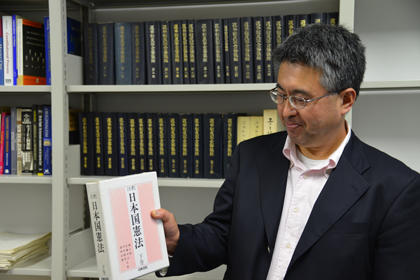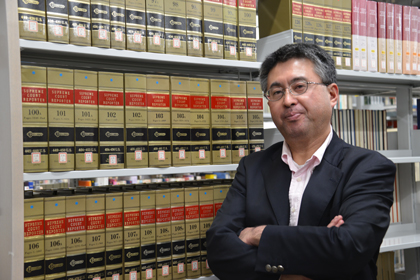TSUKUBA FRONTIER
#04 What is the State? Interpreting the Modern Constitution from a Classical Perspective
A constitution stipulates the basic structure of a nation, and its interpretation, and discussions of possible revisions, are sometimes cause for debate. Yet many people have little occasion to think seriously about the constitution itself. Itself an abstract entity, the constitution is the foundation of the actual lives of the nation's citizens. Professor Oishi explores the true essence of the constitution, in the interstice between abstraction and reality.
Professor OISHI Kazuhiko, Faculty of Business Sciences

■ Modern constitutionalism and the constitution
In deliberations based on the fundamental concept of modern constitutionalism, according to which the powers of the state are constrained by laws, the Japanese Constitution, which ensures human rights and clearly asserts democracy and the separation of powers, could be called a "good constitution." However, laws can be thought of as the "software" that makes society run; and of course, "bugs" are also present. There are likewise bugs in the Constitution: matters that are not stipulated, expressions that allow some room for interpretation.
 Even so, the Japanese Constitution has not once been amended. Changing the laws that are the basis for the state is a serious matter. There are any number of instances of constitutions being amended in other countries, but in nearly all cases these amendments have been limited to rather trivial matters, involving procedural stipulations and the like. In the U.S., over the 200-plus-year history since the establishment of its constitution, there have been over 20 constitutional amendments, but the only major amendments have been the addition of provisions for equal rights (the abolition of slavery) following the American Civil War, and the amendment recognizing suffrage for women following the First World War. It is fundamental to an understanding of constitutional theory to realize that, in the absence of some tragic event that causes citizens to spill each others' blood or a major argument that threatens to sunder the nation in two, in principle, significant changes to a constitution do not occur.
Even so, the Japanese Constitution has not once been amended. Changing the laws that are the basis for the state is a serious matter. There are any number of instances of constitutions being amended in other countries, but in nearly all cases these amendments have been limited to rather trivial matters, involving procedural stipulations and the like. In the U.S., over the 200-plus-year history since the establishment of its constitution, there have been over 20 constitutional amendments, but the only major amendments have been the addition of provisions for equal rights (the abolition of slavery) following the American Civil War, and the amendment recognizing suffrage for women following the First World War. It is fundamental to an understanding of constitutional theory to realize that, in the absence of some tragic event that causes citizens to spill each others' blood or a major argument that threatens to sunder the nation in two, in principle, significant changes to a constitution do not occur.
■ Etiquette of constitutional theory
The study of constitutional law is essentially a discipline concerned with "thinking." It is not possible to accumulate data, construct theories, and verify them through experiment, as in the natural sciences. When a certain thesis is advanced, one searches for contradictions and the like that might occur upon application to society at large, and advances one's position drawing on classical theories, past precedents, and so on. Whatever it is that remains is established as commonly accepted thinking. These ideas are not generally the result of selection from new candidates which advance together with the age; more frequently, their reasonableness is preserved intact. As a result, old theories from centuries past may be applicable to the new problems of this age. In point of fact, much of the charm of constitutional theory lies in arguments that draw on classical standpoints to address such modern problems as, for example, whether restrictions on cloning technology infringe on academic freedom.
It might seem that an ideal constitution could be shared by nations around the world, but the constitutions of different countries reflect their various histories and national characters. Even so, basic human rights are a universal concept, and in recent times, the constitutions and precedents of other nations have come to be cited in Japanese constitutional law precedents as well. The effect on the social order of, for example, the participation of civil servants in political activities or granting of equal rights of inheritance to illegitimate children, can be debated while referencing cases in Europe and America.
■ The quiet yet heated process
Being conducted in this manner, constitutional law is not a field in which dramatic advances are made through new discoveries or breakthroughs. It can be characterized as a process of searching for interpretations, within the scope of the current constitution, that would resolve those problems each time they crop up. Given that there is no unique correct solution that will be convincing to everyone, one makes use of both new and old theories and precedents that follow social trends and other factors, to present an optimal solution that will be most acceptable to all.
The Supreme Court of Japan imparts specific meanings to the ambiguous sections of the provisions, in the form of judicial precedents. Researchers then examine the matter further. Fierce debate then leads to the structuring of society.
■ Understanding the state through laws

A war causes the loss of innumerable lives. Wars occur between nations. That is, humans lose their lives due to the actions of these nations. Just what is a "nation" that can do such things? This simple question, in Prof. Oishi's junior high school years, was the starting-point for his studies of constitutional law. Because the constitution is in fact the rules of the state, the laws that constrain the powers of the state.
Laws exist as textual provisions, but their meaning is conceptual. By means of these laws, the state wages war, imposes penalties, levies taxes. Considering that this means wresting away the lives and fortunes of individuals, it can be said that these actions are not different from crimes. However, we accept them as lawful acts, because we understand them to be actions of the state that are based on laws. While we might think that the law bears no relation to us, in actuality we cannot escape its grasp.
Only justices of the Supreme Court, if appointed by the Cabinet, need not take the Japanese National Bar Exam. This is because it is important that ultimate constitutional judgments reflect a broader range of knowledge and experience. With the introduction of the lay judge system in Japan, the knowledge of ordinary citizens was incorporated into some legal judgments. Although the legal sphere involves many difficult deliberations, it has been brought somewhat closer to the rest of us.
Article by Science Communicator at the Office of Public Relations


